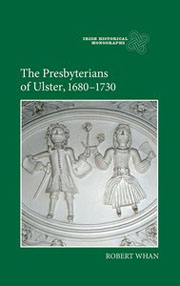Book contents
- Frontmatter
- Contents
- List of Illustrations
- Acknowledgements
- Colophon
- List of Abbreviations
- Editorial note
- Map showing principal places mentioned in the text and approximate presbytery boundaries (1704)
- Introduction
- 1 Ministers
- 2 Gentry
- 3 Merchants and Commerce
- 4 The Professions
- 5 The Lower Orders
- 6 Organisation and Religious Practice
- Conclusion
- Bibliography
- Index
6 - Organisation and Religious Practice
Published online by Cambridge University Press: 05 March 2014
- Frontmatter
- Contents
- List of Illustrations
- Acknowledgements
- Colophon
- List of Abbreviations
- Editorial note
- Map showing principal places mentioned in the text and approximate presbytery boundaries (1704)
- Introduction
- 1 Ministers
- 2 Gentry
- 3 Merchants and Commerce
- 4 The Professions
- 5 The Lower Orders
- 6 Organisation and Religious Practice
- Conclusion
- Bibliography
- Index
Summary
This chapter is concerned with how the different social groups within Presbyterianism organised and worshipped together as a distinctive ecclesiastical community within Ulster society. It will also consider where power lay in Presbyterian society.
Power and authority
The Presbyterian church was governed through a system of representative committees known as ‘courts’. At the local level was the kirk session, which consisted of the minister and a number of elders. There was no fixed number of elders and it was usually dependent on the size of the congregation. The elders were termed ‘ruling elders’ and were unpaid, while the minister, termed a ‘teaching elder’, was paid a stipend. Kirk sessions met regularly and supervised not only the moral and spiritual life of the congregation but also poor relief, congregational education and maintenance of church property. In Ballycarry and Templepatrick deacons were appointed as well as elders, though they were chiefly concerned with the temporal affairs of the congregation rather than its spiritual welfare. In addition to ordinary business meetings, some sessions held special meetings for prayer and theological discussion. The elders were assigned a particular district, or ‘quarter’, over which they had supervision, and at Larne and Lisburn the elders of each district met together in prayer fellowships. At Larne and Kilwaughter, as a result of a resolution agreed on 30 November 1733, the session held meetings in the form of ‘conference which might tend to their knowledge and edification’.
- Type
- Chapter
- Information
- The Presbyterians of Ulster, 1680-1730 , pp. 178 - 198Publisher: Boydell & BrewerPrint publication year: 2013



